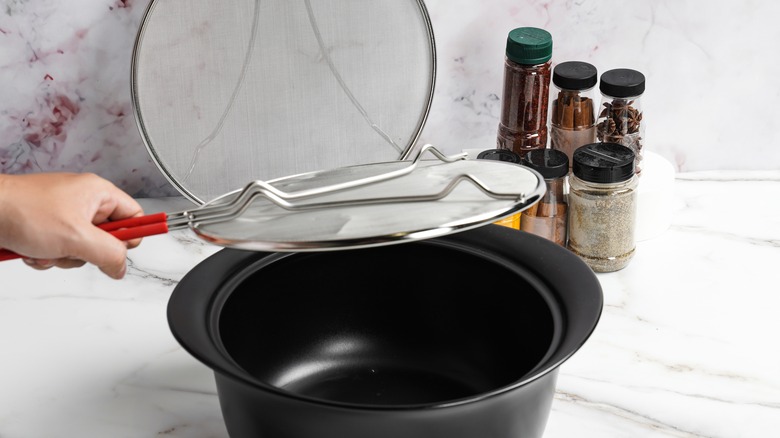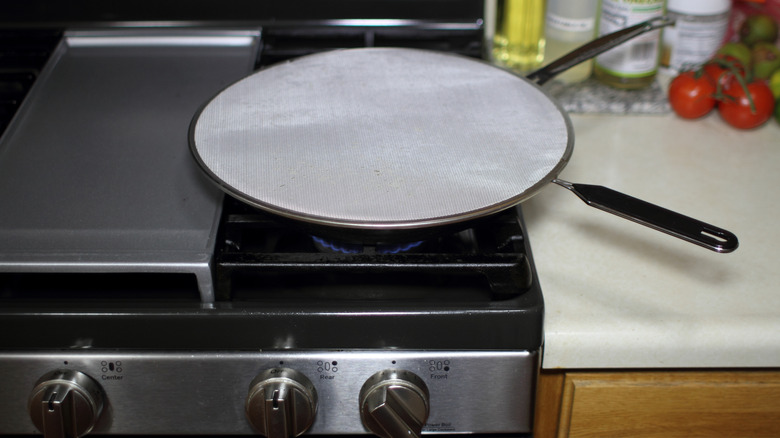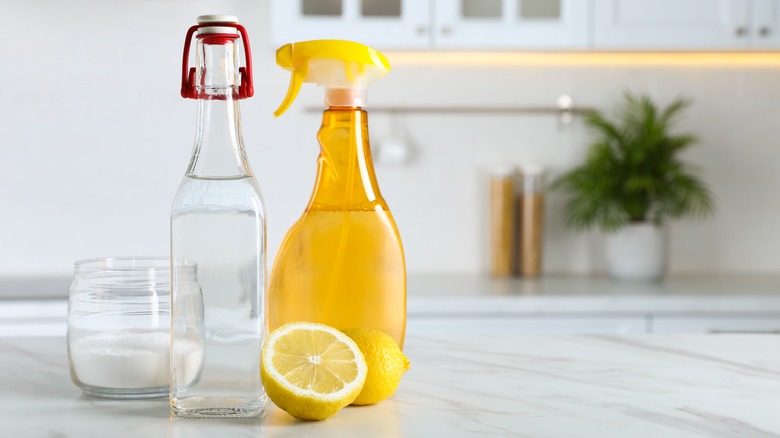Cleaning Your Oily Splatter Guard Is Easy With This Common Kitchen Item
Splatter guards are essential kitchen tools designed to prevent hot oil and food splatters from making a mess on stove tops and countertops and burning any chefs in your kitchen. Over time, with regular use, splatter guards can accumulate oil and grease from the cooking process. This happens because as food is being cooked, tiny droplets of oil and grease are released into the air and can settle on nearby surfaces, including the splatter guard. Additionally, steam and moisture from cooking can cause these oily substances to adhere to the surface of the guard, creating a greasy buildup. Fortunately, a little spritz of oven cleaner can restore your splatter guard to a shiny gloss, ready for its next culinary adventure.
That's right, the same spray you use to clean your oven can also degrease your splatter guards. Oven cleaners are formulated to break down and dissolve tough grease and baked-on food residues, making them highly effective at removing the oily buildup on splatter guards. The active ingredients in oven cleaner work to emulsify and lift away grease and grime, leaving the surface clean and residue-free.
Finally, thoroughly cleaning your splatter guard is a good idea for several reasons. The buildup can become a breeding ground for bacteria if left unchecked, posing health risks. Additionally, the accumulated residue can affect the performance of the splatter guard, potentially reducing its effectiveness. So grab your oven cleaner to banish that grease for good.
How to clean your splatter guard
To clean a splatter guard effectively with an oven cleaner, you'll first need to gather your materials: oven cleaner, rubber gloves, a scrub brush or sponge, and access to a sink or outdoor area with good ventilation. Wear gloves to protect your hands from the chemicals in the oven cleaner. Shake the can of oven cleaner to ensure the active ingredients are thoroughly mixed. Take the splatter guard to a well-ventilated area, such as outdoors or near an open window, to minimize exposure to fumes. Hold the splatter guard over a sink or lay it flat on a protected surface. Spray oven cleaner onto both sides of it. The foam will begin to break down the oily residue and grease buildup on the screen.
Allow the oven cleaner to sit on the splatter guard for the recommended amount of time specified on the product label. This typically ranges from a few minutes to half an hour, depending on the severity. During this time, the active ingredients in the oven cleaner will penetrate and loosen the grease, making it easier to remove. Next, use a scrub brush or sponge to gently scrub the splatter guard, focusing on areas with stubborn residue. Rinse it thoroughly with water to remove any remaining oven cleaner and loosened grease. Finally, dry the utensil completely before storing it or using it again in your kitchen.
Cautions for using this method
When using oven cleaner to clean a splatter guard, it's important to take several precautions to ensure safety. Always wear rubber gloves to protect your skin from the harsh chemicals in the cleaner. Additionally, use the cleaner in a well-ventilated area to minimize exposure to fumes, which can be harmful if inhaled. Avoid spraying the cleaner directly onto any electronic components or sensitive materials, as it may cause damage. Furthermore, follow the manufacturer's instructions carefully, including the recommended contact time and proper disposal of any excess cleaner.
However, despite its effectiveness in removing grease and grime, using oven cleaner on a food-contact tool like a splatter guard may not be the best solution. Oven cleaners contain strong chemicals, which can leave behind residues that are not safe for direct contact with food. Residual traces of these chemicals might contaminate your food and pose health risks if ingested. Therefore, you may consider non-toxic alternatives to clean your splatter guard.
One all-natural option is to create a cleaning solution using equal parts water and vinegar, which has natural degreasing properties. Baking soda is another effective and gentle abrasive cleaner that can help lift away grease and grime when mixed with water to form a paste. Additionally, lemon juice can be used to break down grease and leave behind a fresh scent. These natural cleaning ingredients offer effective cleaning power without the risk of harmful chemical residues, making them safer choices for food-contact surfaces like splatter guards.


